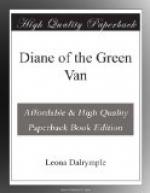The closing of the outer door betokened the departure of Mr. Dorrigan.
Carl swiftly marked the second candlestick where the shallow receptacle in the other had begun and applied the thin, fine edge of a craftsman’s saw. When at length the candled branches lay upon the table, the light of the lanterns overhead revealed, as he had hoped, a second paper.
He was to read the faded sheets, with staring, incredulous eyes, and learn that its contents were utterly unrelated to the contents of the other.
I am impelled by one of the damnable whims which sway me at times to my own undoing, to trust to some chance discovery that which under oath I may never deliberately reveal with my lips. It is the history of certain events which have heavily shadowed my life and brought me up with a tight rein from a life of reckless whim and adventure to one of terrible suffering. I write this with a wild hope that may never be gratified.
The first foreshadowing of this singular cloud came one night in the Adirondack hunting lodge of Norman Westfall, a young Southerner whose inheritance of a childless uncle’s millions had made him a conspicuous figure months before. He was living there with his sister and both, as usual, were at odds with the grim old father down South who resented the wild, unconventional strain that had come into his family through the blood of his wife.
They were a wild, handsome, reckless pair—Ann and Norman Westfall—inseparable companions in wild adventure for which another woman would have neither the endurance nor the inclination.
Ann was a strong, beautiful, impetuous woman with rich coloring; deliciously feminine in her quieter moments, incredibly daring in others; keen-brained, cultured, and utterly unconventional; generous, sympathetic and a splendid musician. Norman worshiped her. She was older than he and without the occasional strain of flippancy which so maddened his father.
Norman and Ann and I had traversed the whole length of the Mississippi to New Orleans on a raft and had traveled thence to this recently inherited Adirondack tract of Norman’s to rest.
“Grant,” he said one night after Ann had gone to bed, “you’ve more brains and brawn and breeding than any man I know, and you’ve splendid health.”
Naturally enough, I flushed.
Norman narrowed his handsome, impudent eyes and regarded me intently.
“And you’re sufficiently clear-cut and good-looking,” he said thoughtfully, “for the purpose. Not so handsome as Ann to be sure, but Ann’s an exceptionally beautiful woman.”
I was utterly at a loss to understand his reference to a purpose and said so. He laughed and shrugged and enlightened me.




